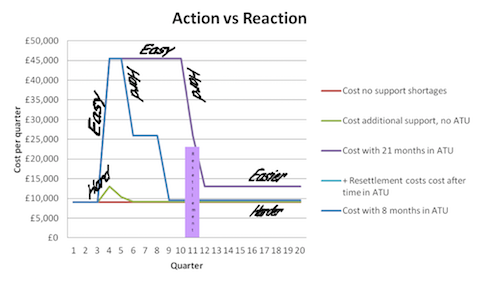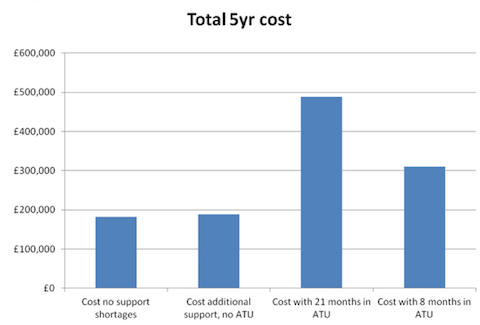Transforming Care – who’s in control here?
‘Locked up’ in learning disability units: ‘I want my son home’ (opens new window) in Community Care last year made my heart sink and my blood boil. The most important message is the impact on Tom and his family and it would be very wrong for me to presume to own that in any way; Tom’s mother Christie lives it and articulates the anguish of it all most poignantly.
So allow me to get angry about the finances and the barriers involved. Firstly, do not think that this is a ‘post-Winterbourne view’ issue; the problem of people being trapped in institutions has been going on for decades. The Winterbourne View horror highlighted it and produced a flurry of activity to address a universally acknowledged wrong. I think we are all too aware that, still, nothing has really changed.
In Tom’s case, the inability of the supported living provider to flex up support started a chain reaction that ended with Tom being sectioned and put in an ATU (Assessment and Treatment Unit) and then getting stuck there for months on end. If we make some assumptions about cost at different stages and that the longer in an ATU, the longer it will take someone to get back to pre-institutional levels (if at all!), various cost scenarios might look like this diagram:

Resulting in some quite startling disparities in overall cost set out below:

Talk about spoiling the ship for a ha'p'orth of tar!
As well as these figures, what struck me was how much easier it was for the step change to higher cost services to happen than the equivalent one back to lower support levels. Being sectioned and sent to an ATU also appears to have been a quicker and more automatic process than finding a few extra staff hours at Tom’s home.
I really hope it’s not just me that thinks this is really perverse?!
KeyRing is a consistent champion of those with power and money letting go of their control and giving it to those whose lives are being affected. In this case, with all the legal, housing and other complexities involved, I would argue that this needs to be supported by some statutory responsibility to make sure the right thing happens, including some independent overview of, even control of, the various budgets involved. Any investment in this would be paid back many-fold in savings, as well as in improved wellbeing.
So, in suggesting solutions, it comes with the caveat that someone needs to take overall control and I hope the new Transforming Care Programme Housing Leads can create the footings set out in NHS England’s ‘Building the right home’ (opens new window). In my view, these foundations need to be built on following three principles:
Prevention
- Flexible, truly outcome-based support that can increase support when needed without the necessity of reassessment or waiting for someone to go into full blown crisis (KeyRing’s Network model can work with a wide group of people at a low level and respond with extra support as soon as signs of increased need appear amongst any of that cohort)
Correction
- The right for Local Authorities to intervene when someone is in an ATU to become a funded, statutory duty to ensure minimum stay in ATUs, with discharge planning from day one
- Holding of budgets for whole process independently of health and social care providers, with one aim, to get the quickest possible recovery and move-on process with the only focus being the individual’s wellbeing
- Automatic provision of advocacy support for individuals and their family, with access to clear guidance, such as Bringing Us Together (opens new window)’s excellent Care & Treatment Reviews Survival Guide (opens new window)
- Realistic capital and revenue funding of housing solutions with some of the risk taken away from housing providers who are being asked to be part of a complex solution that they largely have no influence over
Cultural change
- Prevention is much, much better and way, way cheaper than ‘cure’
- ‘Assessment and Treatment Unit’ is a medicalised, deficit-based name; we should be looking at Minimum-stay Recovery Accommodation
- Recovery and move-on needs an asset-based approach, with good planning, involving the individual, family and other relevant people, with someone with real power making sure it happens
There are huge amounts of money involved here; in virtually any other context this would mean the ‘customer’ would get the best, not the worst. How can anyone condone spending money in ways that reduce their wellbeing?


Comments
Add your comment